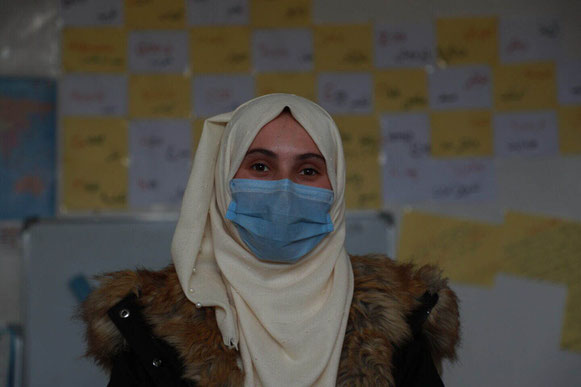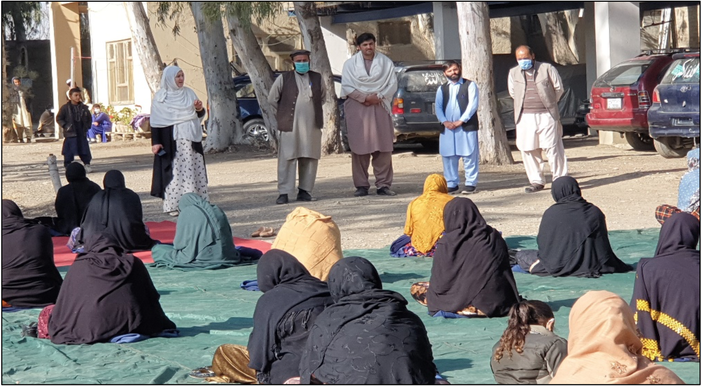University scholarships for young women in Afghanistan

(Photo showing a teacher in front of a blackboard)
Project name: University Scholarship Initiative
for Lower Secondary Community-based Education (LSCBE) students.
Location: Khost Province, Afghanistan, local partner organization: CARE International.
Report 2023
Great concern for the future of the people in Afghanistan
Due to the Taliban's measures to ban girls from university education on the one hand and not to allow female aid workers in humanitarian aid organizations on the other, our aid to Afghanistan will unfortunately come to an end this summer. We very much hope to be able to help there again in the future and that the international community will be more committed to women's rights and to the work of aid organizations in Afghanistan. It is with great sadness that we think of the people there.
Text: Raimund Hopf
Report 2022
Mitgefühl in Aktion, together with Buddhist Global Relief, was supporting -Lower Secondary Community-based Education (LSCBE) for young women in Afghanistan from July 2022 to June 2023 through our local project partner CARE International in Khost Province, with a combined donation of $25,000, including $19,000 from BGR and $6,000 from MiA.
This donation would help young women continue their educational journey and earn a college degree to provide a brighter future for them, their families, and their communities.
The scholarship initiative enables girls from rural areas who previously attended lower secondary education in CARE-supported classes to begin or continue their higher education journey. The scholarships cover the cost of the young women's education, including transportation, textbooks, and university tuition.
After graduation, the women can find employment in their respective fields and earn up to $600 a month, which is currently a substantial salary for a woman working in a rural area of Afghanistan.
In this way, we fight hunger and inequality at its root and can make a lasting contribution to Afghanistan's ability to help itself by helping young women learn trade skills that benefit them, their families, and their country as such, contrary to their government's ideas.
Current Situation.
Following the withdrawal of Western troops and the Taliban's return to powerü the already alarming famine in Afghanistan has worsened due to drought, conflict, increased displacement, rising food prices (currently doubling), the COVID-19 pandemic, and economic decline. Some 18.8 million people, or nearly half of the population, are currently experiencing acute hunger- an increase of nearly 30% from the same time last year. Nearly 23 million people are now impacted by acute hunger. In addition, some 677,000 people have been displaced inside Afghanistan since the beginning of 2021, bringing the total number of internally displaced people to an estimated 2.9 million. At least 80% of the internally displaced are women and children. However, displaced women and girls are at higher risk of experiencing violence, and most women have limited or no legal protection, no health care, and often no education or vocational training.
According to recent estimates, 863 million people in 91 countries worldwide currently suffer from hunger and inadequate nutrition. This situation has been exacerbated by the Ukraine conflict and the resulting delays or stoppages in the supply of grain and other foodstuffs. This also makes it increasingly difficult to not forget the still very dramatic situation in Afghanistan. In addition to this, the current news coverage hardly reports on the situation in Afghanistan anymore.

(Entrance examination for scholarships under the supervision of the Taliban's Ministry of Education).
However, so far the work of our scholarship initiative continues despite the political change. Despite delays in resuming classes for high school girls, the de facto Taliban government has partially allowed young women to continue their higher education, albeit in gender-segregated classes, which is unfortunately often not evident from individual Western reports on school bans for Afghan girls. An important indicator for us is the information from our local partner, that the current work that BGR/MiA supports in Afghanistan has not been affected by the recent developments. This means, that it is absolutely worthwhile for the girls in Afghanistan to continue this work there. The scholarship exams are even conducted under the supervision of government officials.
Currently, 124 female students are studying in various programs, including 36 medical students, 56 midwives, 19 nursing students, five stomatology (ear, nose, and throat) students, and eight law students. With our joint assistance (BGR/MiA), 37 of these students are currently receiving direct support.
Medical education in Khost province supported by BGR/MiA (3 pictures of classes)
Fahima has made it
Fahima, who received a university scholarship and recently graduated from her midwifery training as the top student, is an example of the positive change scholarships can bring. When she graduated from high school, Fatima initially did not pass the state university entrance exam. Her 17-person family, dependent on her elderly father as the sole breadwinner, was unable to help her prepare for the exam or to secure tuition.
She recalls, "My family could not pay the tuition fees and I failed the entrance exam. Receiving an education at a state university was now impossible. Due to my failure, I became depressed and stayed at home for days, refusing to see family members or friends who wanted to visit me."
After initially losing all hope for her academic and professional future, Fahima decided to apply for a CARE scholarship. Her family agreed and wished her good luck.
Fahima's luck was now turned around. She did well in the competition and received a scholarship made possible by our support. So she decided to follow her dreams and became a midwife, studied hard for two years and finally graduated with the highest score in her class. Fahima is now the first person in her family to receive any medical education at all - including the men of the family.
She comments: "If I compare myself to the situation two years ago, I am a completely different person now." Fahima now teaches her family and neighbors how to deal with difficulties and stress, and most importantly, she now has a strong sense of self-worth and believes in her future. Fahima adds that her greatest desire is to lead a meaningful and good life for herself, her family, and others through her future medical work.
An future outlook of our work, for which we are collecting donations now.
In addition to the current female students, 121 graduating 12th graders have already applied for future scholarships from our program this year; of these, 71 have successfully passed the entrance exams and have been accepted to universities in the following fields: Medicine (12 students), Midwifery (40 students), Nursing (12 students), Stomatology (four students), and Law (three students), who will be supported by our assistance in the coming year.
Our local partner also runs educational projects that support primary and lower secondary schools. In communities where girls' schools have not been allowed to reopen, our partner supports remote learning and helps teachers continue to provide educational opportunities for their students despite existing political restrictions. Our partner has been active in Afghanistan for decades (even during the last Taliban period). Close relationships have been established with local communities, village and religious elders, and government authorities, which allow us to continue our work there regardless of political changes. In Khost province, our partner maintains very close partnerships with the regional offices of the Ministry of Education.
Text: Raimund Hopf











